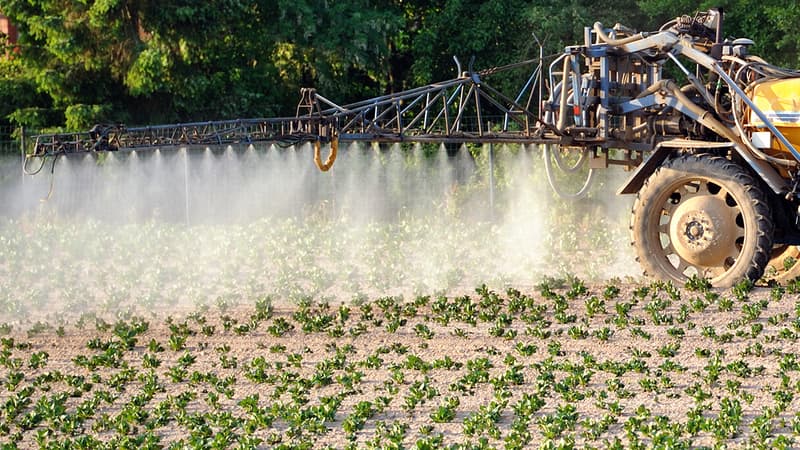Are we “all exposed”? Several organizations launched this online platform on Monday, February 24, called “all exposed” online, aimed at “measuring and understanding exposure to chemical pesticides.”
“What begins in the fields, affects the living and ends on our plates,” we can read on the site home page.
Four environmental associations, “future generations”, “toxic secrets”, “Noah” and “We are ready”, have combined economic actors in the organic sector such as “La Maison de la Bio”, as well as mutuelles to launch this platform.
Organizations want to show the impact of pesticides on farmers and residents, ecosystems and our diet.
France, the first pesticide market in Europe
For this, the platform offers two interactive cards. The first, called Adonis, allows to see the use of chemical pesticides by the municipality. Developed thanks to the data of the Solagro Association, it shows a significant use of these phytosanitary products, particularly in northern France and in the large Parisian basin, as well as in the Bordeaux region and near the Mediterranean.
The second Geophyto card, developed by Future Generations, allows to visualize which pesticides are the most purchased by the department and its impacts on health or the environment.
According to the platform, with 68,539 tons sold in 2022, France is the first pesticide market in Europe, ahead of Spain (56,353 tons) and Germany (48,169 tons).
“It also rises in the third step of the podium in the number of pesticide substances, with 291 substances authorized in France in February 2023, against an average of 220 in Europe, so it is classified just behind Greece and Spain,” Read.
Associations encourage organic agriculture
The “All exposed” platform also aims to challenge public authorities on the issue of pesticides and denounce the “regressions” of public policies on this issue. Therefore, it is directly possible on the site to challenge the Minister of Health, Yannick Neuder and his office.
“We propose to send an email with a single click that asks Yannick Neuder to register in the law not exposure to chemical pesticides because it is the health of all those who are at stake, starting with our farmers,” he explains to France Inter Magali Payen, the “We are ready” movement.
Organizations also invite the government to “include non -exposure to pesticides in future national food strategies (…) Already registering in the law a consumption objective of 12% of organic agriculture products in 2030”.
In France, the Egalim Law establishes the objective of achieving at least 50% of quality and sustainable products, including at least 20% of organic products in collective restoration. Figures that have not yet been achieved.
Risks to human health
“For 30 years, there is a diet without synthetic pesticides and chemical fertilizers called agriculture and organic food, it represents between 5% and 6% of food and constitutes a simple solution to minimize our exposure of pesticides in food,” he said, “he said.” The bio maison “Inter Christophe Barnouin.
Pesticide residues are regularly in our food or in the water we drink. In May, the world revealed that 97% of the French groundwater was contaminated by one or more pesticide, or by degradation products of these substances, metabolites.
Links between exposure to pesticides and certain diseases such as lymphomas that are not from Hodgkin (NHL), multiple myelome, cancer or Parkinson’s disease have been established. Recently, for example, Justice has recognized a link between the death of a young child and his mother’s Florist’s profession, due to exposure to pesticides when she was pregnant.
The Agricultural Orientation Law was definitively adopted in Parliament this Thursday. A measure concerns the left and environmentalists: what invites the government to “refrain from prohibiting the uses of the protection of plants authorized by the European Union” in the absence of viable alternatives.
A bill was also voted at the end of January in the Senate at the end of January, in particular to lift the prohibition of certain neonicotinoid pesticides, harmful to bees.
Source: BFM TV


